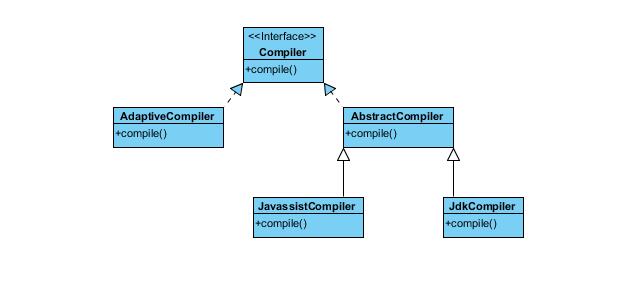我们运行的Java代码,一般都是编译之后的字节码。Dubbo为了实现基于SPI思想的扩展特性,可以灵活的添加额外的功能。对于SPI接口需要能够动态生成,这样就需要在运行的时候去编译加载这个设配类的代码。下面我们就是来了解下Dubbo的动态编译。
我们首先来看一下Compile的类图。

Compile接口定义:
@SPI("javassist")public interface Compiler {/*** Compile java source code.** @param code Java source code* @param classLoader TODO* @return Compiled class*/Class<?> compile(String code, ClassLoader classLoader);}
- @SPI(“javassist”):表示如果没有配置,dubbo默认选用javassist编译源代码
- 接口方法compile第一个入参code,就是java的源代码
- 接口方法compile第二个入参classLoader,按理是类加载器,用来加载编译后的字节码,其实没用到,都是根据当前线程或者调用方的classLoader加载的
在上面一个章节内核SPI。我们说过对于dubbo SPI通过@SPI注解与@Adaptive实现,它有两种实现方式。
Dubbo源码(一) 内核SPI实现
- @Adaptive注解在标注@SPI接口的方法上,扩展类就是通过Compile字节码技术动态编译。
编译后的代码模板如下所示。
package <扩展点接口所在包>;public class <扩展点接口名>$Adpative implements <扩展点接口> {public <有@Adaptive注解的接口方法>(<方法参数>) {if(是否有URL类型方法参数?) 使用该URL参数else if(是否有方法类型上有URL属性) 使用该URL属性# <else 在加载扩展点生成自适应扩展点类时抛异常,即加载扩展点失败!>if(获取的URL == null) {throw new IllegalArgumentException("url == null");}根据@Adaptive注解上声明的Key的顺序,从URL获致Value,作为实际扩展点名。如URL没有Value,则使用缺省扩展点实现。如没有扩展点, throw new IllegalStateException("Fail to get extension");在扩展点实现调用该方法,并返回结果。}public <有@Adaptive注解的接口方法>(<方法参数>) {throw new UnsupportedOperationException("is not adaptive method!");}}
例如com.alibaba.dubbo.rpc.Protocol接口的动态编译的扩展类Protocol$Adpative为:
package com.alibaba.dubbo.rpc;import com.alibaba.dubbo.common.extension.ExtensionLoader;public class Protocol$Adpative implements Protocol {public void destroy() {throw new UnsupportedOperationException("method public abstract void com.alibaba.dubbo.rpc.Protocol.destroy() of interface com.alibaba.dubbo.rpc.Protocol is not adaptive method!");}public int getDefaultPort() {throw new UnsupportedOperationException("method public abstract int com.alibaba.dubbo.rpc.Protocol.getDefaultPort() of interface com.alibaba.dubbo.rpc.Protocol is not adaptive method!");}public com.alibaba.dubbo.rpc.Exporter export(Invoker invoker) throws RpcException {if (invoker == null) throw new IllegalArgumentException("com.alibaba.dubbo.rpc.Invoker argument == null");if (invoker.getUrl() == null)throw new IllegalArgumentException("com.alibaba.dubbo.rpc.Invoker argument getUrl() == null");com.alibaba.dubbo.common.URL url = invoker.getUrl();String extName = (url.getProtocol() == null ? "dubbo" : url.getProtocol());if (extName == null)throw new IllegalStateException("Fail to get extension(com.alibaba.dubbo.rpc.Protocol) name from url(" + url.toString() + ") use keys([protocol])");Protocol extension = ExtensionLoader.getExtensionLoader(Protocol.class).getExtension(extName);return extension.export(invoker);}public com.alibaba.dubbo.rpc.Invoker refer(java.lang.Class arg0, com.alibaba.dubbo.common.URL arg1) throws RpcException {if (arg1 == null) throw new IllegalArgumentException("url == null");com.alibaba.dubbo.common.URL url = arg1;String extName = (url.getProtocol() == null ? "dubbo" : url.getProtocol());if (extName == null)throw new IllegalStateException("Fail to get extension(com.alibaba.dubbo.rpc.Protocol) name from url(" + url.toString() + ") use keys([protocol])");com.alibaba.dubbo.rpc.Protocol extension = (com.alibaba.dubbo.rpc.Protocol) ExtensionLoader.getExtensionLoader(com.alibaba.dubbo.rpc.Protocol.class).getExtension(extName);return extension.refer(arg0, arg1);}}
- @Adaptive注解在标注@SPI接口的实现类上,扩展类就是这个类。
例如这里的Compile的SPI扩展就是AdaptiveCompiler这个类。
@Adaptivepublic class AdaptiveCompiler implements Compiler {private static volatile String DEFAULT_COMPILER;public static void setDefaultCompiler(String compiler) {DEFAULT_COMPILER = compiler;}public Class<?> compile(String code, ClassLoader classLoader) {Compiler compiler;ExtensionLoader<Compiler> loader = ExtensionLoader.getExtensionLoader(Compiler.class);String name = DEFAULT_COMPILER; // copy referenceif (name != null && name.length() > 0) {compiler = loader.getExtension(name);} else {compiler = loader.getDefaultExtension();}return compiler.compile(code, classLoader);}}
AdaptiveCompiler是Compiler的设配类,它的作用是Compiler策略的选择,根据条件选择使用何种编译策略来编译动态生成SPI扩展 ,默认为javassist.
AbstractCompiler是一个抽象类,它通过正则表达式获取到对象的包名以及Class名称。这样就可以获取对象的全类名(包名+Class名称)。通过反射Class.forName()来判断当前ClassLoader是否有这个类,如果有就返回,如果没有就通过JdkCompiler或者JavassistCompiler通过传入的code编译这个类。
Java字节码框架 Javassist使用
dubbo-adpative – dubbo spi adpative动态编译代码github地址

